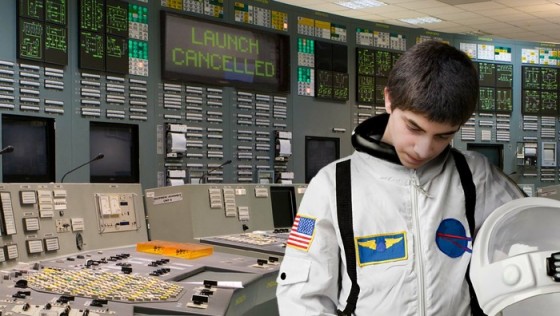The Onion has an article that’s both funny and sad, because it hits close to home. It’s about making Space Camp a more realistic experience for kids by simulating the constant budget struggles faced by NASA. Without further ado, I’ll quote the article:
Camp organizers explained that the redesigned education program will offer kids the unique opportunity to contend with all of the budgetary restrictions and bureaucratic red tape impeding the progress of actual astronauts and researchers, allowing children from grades four to six to immerse themselves in a true-to-life NASA environment in which financial shortfalls and endless procedural delays plague them at every turn.
“At Space Camp, each attendee experiences the trials of real-life astronauts who simply are not provided the resources they need to explore outer space,” said director Deborah Barnhart, noting that campers get a firsthand look at what it’s like to pursue cutting-edge astronomical research on a budget that, when adjusted for inflation, is a mere fraction of what it was in the 1960s. “Our campers endure constant setbacks throughout their week here, from engaging in spaceflight training modules that can be shut down at a moment’s notice, to working tirelessly on a solar probe project only to be informed that an across-the-board spending freeze has led to the indefinite suspension of their work.”
“Kids will walk away from a week at Space Camp knowing exactly what it’s like to be an American astronaut,” she added.
Barnhart told reporters that the modernized camp offers attendees an array of hands-on activities that include designing next-generation spaceships, searching for virtual extrasolar planets, and building a robotic Mars rover, any one of which could be effectively derailed by an abrupt mandate that the research and development process be made more cost-effective.
Additionally, campers will reportedly be able to sigh and throw their hands up in exasperation within a replica of the actual mission control room at the Lyndon B. Johnson Space Center after learning that a reconnaissance mission to scan for the presence of life on Jupiter’s moon Europa has been scrapped just weeks prior to the intended launch date.
Program officials also highlighted their efforts to make the experience as realistically discouraging as possible by furloughing a significant number of campers immediately at the start of each weeklong session.
“We put camp attendees in the shoes of dedicated NASA scientists whose attempts to further scientific understanding through the analysis of asteroid composition are halted by one of our camp staffers playing the role of a U.S. senator targeting all ‘nonessential’ initiatives,” said counselor Tyler Campbell. “When they take their seats in our mock congressional chamber, campers will work together to deliver an impassioned yet ultimately futile request for continued support of NASA until they have no choice but to stand up and leave, having just witnessed their life’s work go up in smoke.”
“When you see the stunned expressions on these kids’ faces as they realize their goals and dreams are no longer attainable because of political pressures completely out of their control, that’s when you know they’ve gained a valuable understanding of our space program,” Campbell added.
Early participants in the new program have reportedly hailed the experience as “eye-opening,” with many describing their visceral disappointment watching satellite feeds of their Chinese and Russian Space Camp counterparts pursuing scientific endeavors that were eliminated in the U.S. years ago.
“I’ll never forget what it was like to go to Space Camp and repeatedly attempt to convince the budget committee of the importance of our solar wind study so they would cancel the other teams’ projects and not ours,” said 11-year-old camper Sara Andrews, who explained that she spent most of the week steadily reducing the scope of her simulated mission so that it would remain financially viable. “I’m just glad I wasn’t working on the asteroid flyby project that was ultimately deemed too cost-prohibitive and was contracted out to a private aeronautics firm. The kids on that team just had to sit around and do nothing for the rest of camp.”
“I can’t wait to work at NASA when I grow up so I can constantly stress over limited financial resources and have my scientific projects canceled for real,” she added. “That is, if NASA even still exists then.”
Nailed it.

